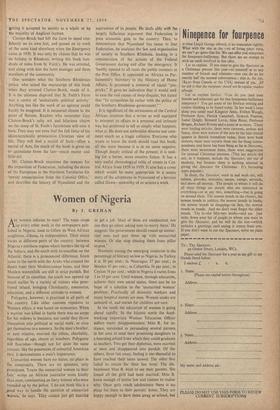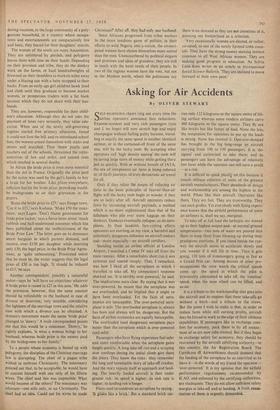Women of Nigeria
By I. GREHAN AE women inferior to men? The topic crops up every other week in the newspapers pub- lished in Nigeria, soon to follow its West African neighbour, Ghana, to independence. Their status varies in different parts of the country: between Nigeria's northern region which borders the tip of the Sahara, and the south with its coastline on the Atlantic, there is a pronounced difference. Islam came to the north with the Arabs who crossed the desert from their Mediterranean bases, and their Moslem womenfolk are still in strict purdah. But because of its coastline, the south was opened up much earlier by a variety of visitors who pene- trated inland, bringing Christianity, commerce, education, and a different attitude to women.
Polygamy, however, is practised in all parts of the country. Like other customs repulsive to Western ethics, it was based on economics. When a warrior was killed in battle there was no scope for his widows in business, nor could they throw themselves into political or social work, or even get themselves to a nunnery. So the man's brother, or next relative, married the relicts, charitably, regardless of age, charm or numbers. Polygamy still flourishes—though not for quite the same reasons: like the possession of colourful American cars, it demonstrates a man's importance.
Unmarried women have no status; no place in the community. There are no spinsters, only prostitutes: 'Leave the unmarried women to their fate,' writes an African journalist more kindly than most, comMenting on forty women who were rounded up by the police. 'I do not think this is a ,good way to handle the question of unmarried Women,' he says. 'They cannot just get married or get a job. Most of them are uneducated, nor can they go about asking men to marry them.' He suggests 'the goVernment should round up unmar- ried men and pair them up with unmarried women. Or else stop chasing them from pillar to post.'
Nowhere among the emerging countries is the percentage of literacy so low as Nigeria. In Turkey , it is 30 per cent.; in Nicaragua 37 per cent.; in Mexico 45 per cent.; in Columbia 56 per cent.; in Ceylon 58 per cent.; while in Nigeria it varies from 1 to 10 per cent. Until women, through education, achieve their own social status, there can be no hope of a solution to the 'unmarried women' problem. Practically all domestic workers and many hospital nurses are men. Women cooks are unheard of, and nurses for children are rare.
In the south the education of women is going ahead rapidly. In the Islamic north the hard- working expatriate Woman Education Officer suffers many disappointments. Miss B., for in- stance, succeeded in persuading several parents in her area to send their promising daughters to a boarding school from which they could graduate as teachers. Two got their diplomas, were married at once and disappeared into purdah. Of the others, three ran away, feeling it too shameful to have reached their teens unwed. The other five failed to return for their last term. The dis- heartened Miss B. went to see their parents. She found' all the girls had been married. Miss B. kneW enough of native law' aw and custom to realise why. Once girls reach adolescence there is no place for them in their parents' home. They are happy,enough to have them away at school but during vacation, in the, large community of a poly- gamous household, in a country where occupa- i tions and entertainments are comparatively few and basic, they feared for their daughters' morals.
' . The women of the south are more Amazonian. 1 They are unfettered by purdah, and polygamy • i leaves them with time on their hands. Depending q on their province and tribe, they do the donkey .' work on the farms, or haul hundredweights of firewood on their shoulders to markets miles away under a blazing sun with a baby strapped to their backs. From an early age girl children hawk food and cloth until they graduate to become market women, or prosperous traders with a fat bank account which they do not share with their hus- bands.
They are, however, responsible for their child- ren's education. Although they do not take the payment of taxes very seriously, they value edu- cation. When one of the newly self-governing regions started free primary education, found it could not foot the bill, and re-introduced school fees, the women armed themselves with sticks and stones and marched. They threw pupils and teachers out of the schools, threatened the repre- sentatives of law and order, and caused riots which resulted in several deaths.
' In Africa the bride price is even more essential than the dot in France. Originally the price paid by the suitor was used by the girl's family to buy a bride for her brother. Like prices everywhere, inflation has hit the bride price, provoking would- be bridegrooms to air their grievances in the papers.
'Raise the bride price to £25,' says Enugu town. 'Cut it to £15,' says Kaduna. 'Make £50 the maxi- mum,' says 'Lagos. 'Don't blame government for bride price racket,' says a fierce letter about 'much rubbish and half-understood nonsense which has been published about the ineffectiveness of the Bride Price Law.' The letter goes on to denounce secret bargains in which parents demand, and receive, over £150 per daughter while inserting only £50, the legal price, in the Bride Price Agree- ment, as 'quite• unbecoming.' Frustrated suitor that he must be, the writer suggests that the legal price of £50 is too high. 'It should be reduced to £15,' he says.
Another correspondent, possibly a successful suitor—says he 'will have no objections whatever if bride price is raised to £25 in this area.' He adds the provision, however, that the same amount should be refundable to the husband in case of divorce or desertion; very sensible, considering the lightness of the marriage vows and the relative ease with which a divorce can be obtained. A women's movement wants the name 'bride price' changed to 'dowry.' A male correspondent points out that this would be a misnomer. 'Dowry,' he rightly explains, 'is what a woman brings to her husband, whereas bride price is the money paid by the bridegroom to her family.'
To a people whose economy is bound up with Polygamy, the discipline of the Christian marriage law is disrupting. The chief of a pagan tribe wished to embrace Christianity. The missionary pointed out that, to be acceptable, he would have to content himself with one only of his fifteen wives. The chief said this was impossible. What would become of the others? The missionary was adamant—one wife only, or no Christianity. The chief had an idea. Could not his wives be made Christians? After all, they had only one husband.
Since Africans progressed from tribal warfare to the more insidious game of politics, in their efforts to weld Nigeria into a nation, the emanci- pated women have shown themselves more united than the men. Unencumbered by political slogans and promises and ideas of grandeur, they are still in touch with the basic needs of their people. In two of the regions women have the vote, but not in the Moslem north, where the politicians say there is no demand as they are not conscious of it, pointing out Switzerland as a criterion.
Very occasionally women are elected, or rather, co-opted, to one of the newly formed town coun- cils. They have the strong money-making instinct common to all West African women. They are making good progress in education. As Sylvia Leith-Ross writes in an article in International Social Science Bulletin, 'They are inclined to move forward at their own pace.'



























































 Previous page
Previous page